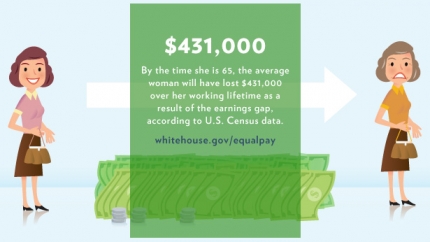Blog Posts Related to the African American Community
Equipping Small Business with More Tools: Procurement Day at National Small Business Week
Posted by on June 5, 2012 at 11:14 AM ESTEd Note: This is a cross-post from the Small Business Administration blog.
If you were to ask a small business owner to identify a top priority on his or her wish list, undoubtedly they would say “to get more business!” We know that one way to get more business is to contract with the Federal government - the largest purchaser of goods and services in the world. In FY10, nearly $100 billion federal contracting dollars went to small businesses. During this year’s National Small Business Week, the Small Business Administration worked to ensure small businesses made the right connections and gained access to federal contracting opportunities.
Matchmaking Procurement Opportunities
On May 22nd, during Procurement Day of National Small Business Week, SBA hosted a Business Matchmaking event that allowed small businesses to discuss procurement opportunities with major corporations and federal agencies. The event gave more than 150 small businesses from across the country an opportunity to have face-to-face meetings with major corporations and federal agencies to learn about specific contracting opportunities.
SBA’s Procurement Day also featured federal contracting panels on gaining access to federal prime contracting and subcontracting opportunities. During these panels, small businesses learned how to market themselves to the federal government and go after government contracting and sub-contracting opportunities. Small businesses heard from SBA experts about the agency’s contracting programs for small businesses. SBA officials walked small businesses through the federal procurement process as well as small business contracting programs such as the 8(a) Business Development program, HUBZone program, Women-Owned, and Service-Disabled Veteran-Owned Small Business Programs. Small businesses heard first-hand how they can gain access to federal contracts to grow and create jobs.
Learn more about EconomyBy the Numbers: $431,000
Posted by on June 4, 2012 at 12:16 PM ESTThe gender wage gap puts women at a career-long disadvantage. In 2011, a typical 25-year-old woman working full-time all year earned $5,000 less than a typical 25-year-old man. In just 10 years, her cumulative lost wages will reach $34,000. If that earnings gap is not corrected, by the age of 65 years, she will have lost $431,000 over her working lifetime.
This substantial gap is more than a statistic -- it has real life consequences. When women, who make up nearly half the workforce, bring home less money each day, it means they have less for the everyday needs of their families, and over a lifetime of work, far less savings for retirement.
President Obama supports passage of the Paycheck Fairness Act, which Congress puts to a vote on June 5. This comprehensive and common sense bill updates and strengthens the Equal Pay Act of 1963, which made it illegal for employers to pay unequal wages to men and women who perform substantially equal work.
On a call today, the President talked about the impact of paycheck inequality on American families: “We've got to understand this is more than just about fairness. Women are the breadwinners for a lot of families, and if they're making less than men do for the same work, families are going to have to get by for less money for childcare and tuition and rent, small businesses have fewer customers. Everybody suffers. .”
You can learn more about the Paycheck Fairness Act, and check out some e-cards that explain how income inequality affects American families here.
Equal Pay for Equal Work?
Posted by on June 1, 2012 at 11:53 AM ESTIt's 2012, but did you know that women are still paid less than men?
On average, full-time working women earn just 77 cents for every dollar a man earns, a wage gap that exists regardless of personal choices like education or occupation. Over the course of her career, a woman with a college degree will earn hundreds of thousands of dollars less than a man who does the same work.
This substantial gap is more than a statistic -- it has real life consequences. When women, who make up nearly half the workforce, bring home less money each day, it means they have less for the everyday needs of their families, and over a lifetime of work, far less savings for retirement.
President Obama supports passage of the Paycheck Fairness Act, which Congress puts to a vote on June 5. This comprehensive and commonsense bill updates and strengthens the Equal Pay Act of 1963, which made it illegal for employers to pay unequal wages to men and women who perform substantially equal work.
We’ve created some ecards that you can send via email or share on social media with reasons equal pay for equal work is essential. Pick your favorite, or send them all!
Prioritizing Low-Income Families and Creating Pathways to Opportunity for All Americans
Posted by on May 31, 2012 at 10:43 AM ESTEd. Note: This op-ed first ran in The Grio
Throughout his distinguished career, Bob Herbert has helped shine a spotlight on the lives of Americans living in poverty – a group that is too often ignored. That was certainly true of his May 21st column, in which he told the story of 20 poor children from the Bronx who are growing up in truly appalling conditions. It was heartbreaking to hear about the children Mr. Herbert met: The girl who told him, “I never feel safe.” The child who said she felt there was no purpose to her existence. The stories they told about too many shootings, and too few jobs.
Mr. Herbert expressed understandable frustration that our political discourse rarely focuses on the notion that the American dream is closed off to far too many of our citizens. But when Mr. Herbert suggested that President Obama has “given up” on the idea of opportunity and upward mobility, he was simply wrong.
There’s a basic bargain in America. It says that no matter who you are or where you’re from, if you’re willing to work hard and play by the rules you should be able to find a good job, feel secure in your community, and support a family. I have worked in the White House since the day President Obama took office. At every juncture-every big decision, every major policy development, every negotiation -- I have seen President Obama fight for the things that help our country preserve that bargain for all Americans, rich or poor.
Learn more about PovertyThe First Lady Reminds HBCU Students of Their Legacy In America's History
Posted by on May 16, 2012 at 2:38 PM ESTOn Saturday, May 12, First Lady Michelle Obama delivered the commencement address for the graduating class of North Carolina Agricultural and Technical University (NC A&T), a historically black university located in Greensboro, North Carolina.
The First Lady began by noting the many A&T alumni who broke through glass ceilings in fields of law, science, and business:
You have produced some of our nation's finest leaders in business, government, and our military. The first African American Justice on the North Carolina Supreme Court was an Aggie. So was the second African American astronaut. And so were those four young men who sat down at a lunch counter 52 years ago and will stand forever in bronze in front of the Dudley building.
Mrs. Obama also retold the story about the Greensboro Four --students who did more than participate in a sit-in at Woolworths to desegregate lunch counters during the 1960s. They were also an inspiration for justice and civil disobedience during the collective effort toward equal rights for all Americans:
It all started because a small group of young people had their eyes open to the injustices around them. It all started because they decided, as one fo the four told the newspaper on the first day of the protests, that it was "time for someone to wake up and change the situation." And that, more than anything else, is the story of our nation's progress right from the very beginning.
The First Lady closed with a call to action for the 1200 graduates to not just focus on climbing the career ladder job titles, but to continue fighting to change the many injustices that still exist today:
Each generation lookas at the world around them and decides that it's time to wake up and change the situation. And we've always looked to our young people to lead the way. We always have.
So graduates, now it's your turn. It's time for you to take that baton. Take it. It's time for you to carry the banner forward. It's time for you to wake the rest of us up and show us everything you've got.
Click here to read Mrs. Obama's full commencement speech to the 2012 Graduating class of North Carolina A&T.
Heather Foster is an Associate Director for the White House Office of Public Engagement
Learn more about EducationInfographic: How Refinancing Can Help Families
Posted by on May 14, 2012 at 10:20 AM ESTEd. Note: This post was originally published on Treasury Notes.
Today, millions of Americans who are current on their mortgage payments cannot refinance at historically-low interest rates. The President is proposing legislation that would allow more homeowners to refinance. Under the President’s plan, they would have two refinancing options.
Check out what those options are in this infographic (click here or on the image below to see the full infographic):
Learn more about Economy, ,
- &lsaquo previous
- …
- 14
- 15
- 16
- 17
- 18
- 19
- 20
- 21
- 22
- …
- next &rsaquo


